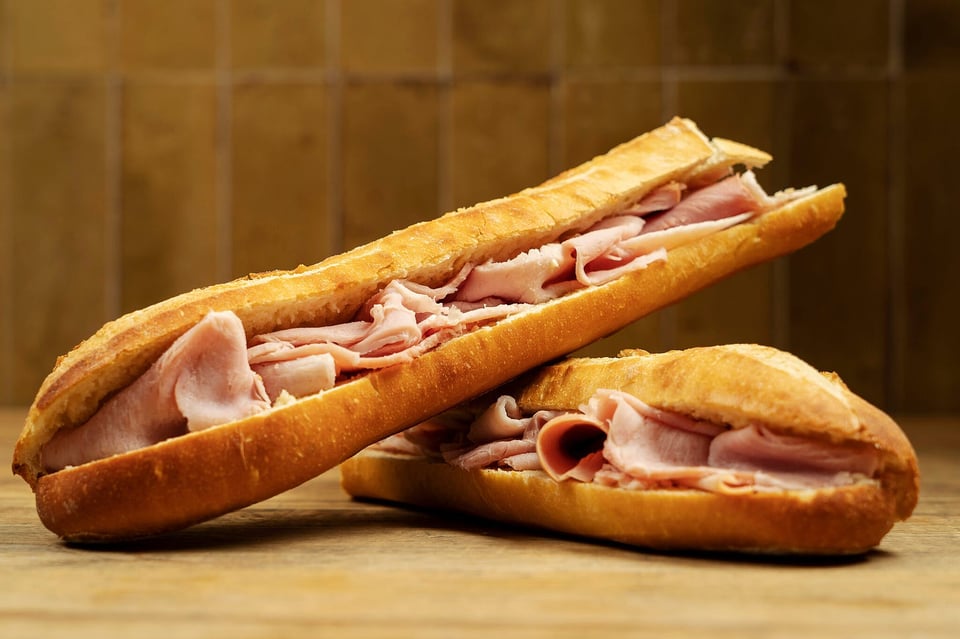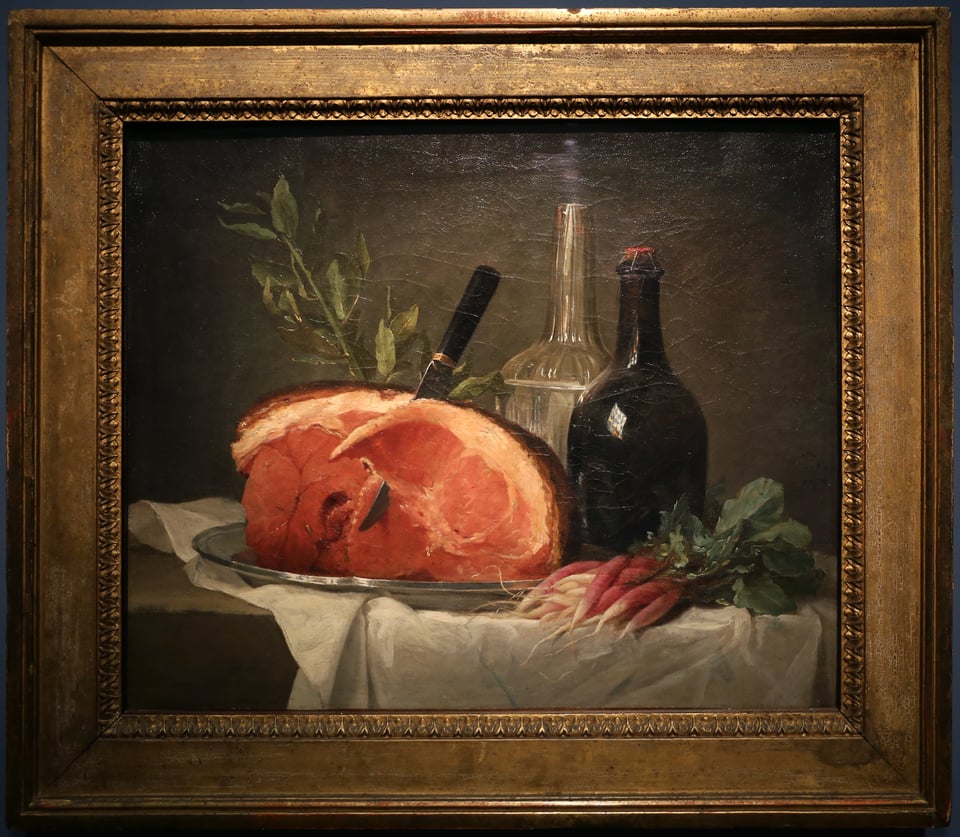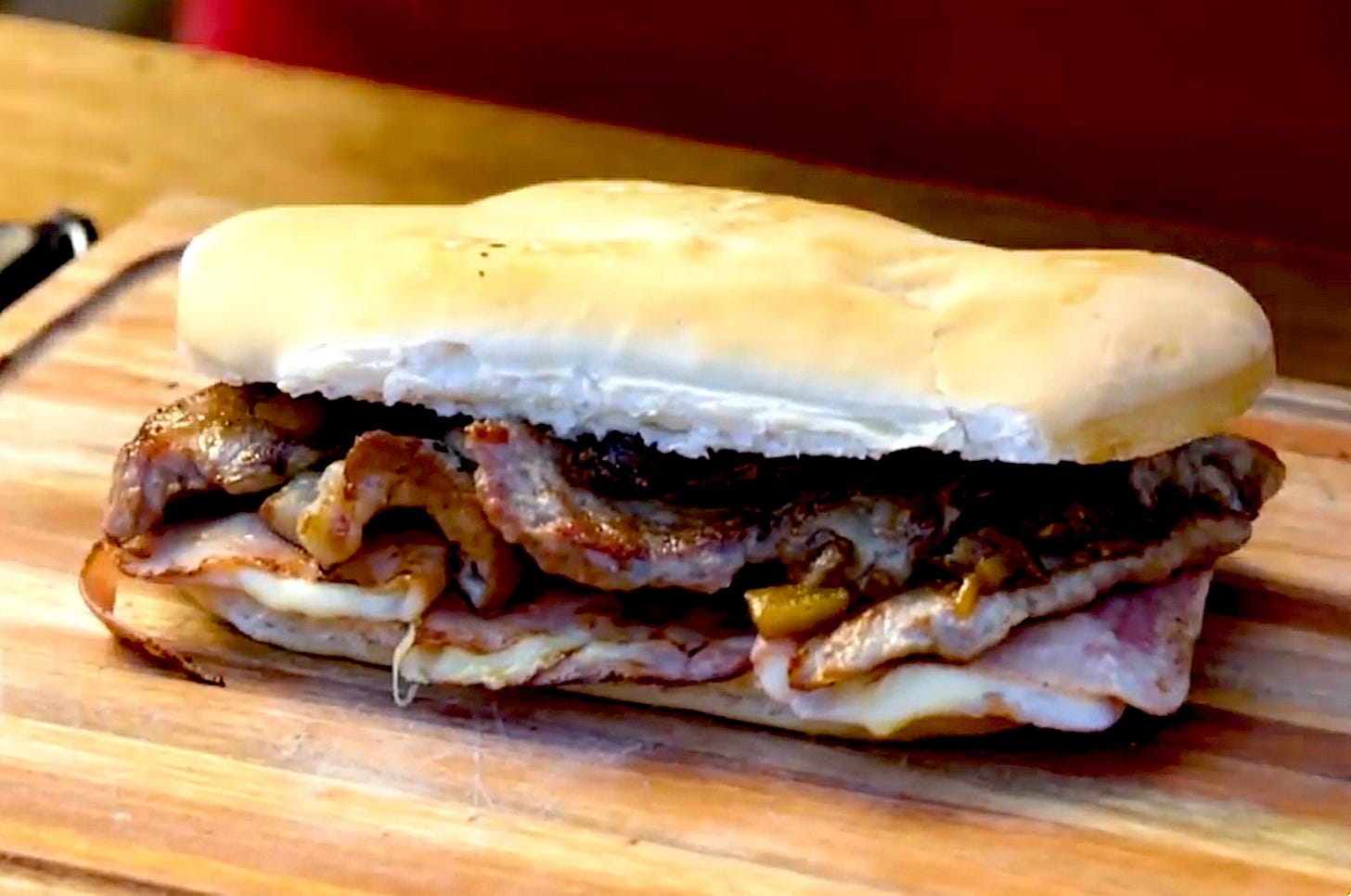Notable Sandwiches #80: Five Ways of Looking at a Ham Sandwich

Welcome back to Notable Sandwiches, the feature where we trip merrily through the bizarre and mutable document that is Wikipedia’s List of Notable Sandwiches, in alphabetical order. This week, a universal canvas: the ham sandwich.

Hello and welcome to our second broadcast from Buttondown! I’ve been working to fix up any trouble in the migration—paid subscriptions that haven’t ported over, subscribers who got left out of the new list, etc.—and if you do have any issues or concerns, feel free to shoot me an email at talialavinwrites @ gmail dot com so I can be sure to address them personally! Newsletter migration is tough and stressful and I’m doing my best to make sure you’re not experiencing a bumpy landing or any interruptions. The fact that I’ve made this move out of principle doesn’t mean I am willy-nilly ignoring any inconveniences! So please don’t hesitate to get in touch.
BECOME A PAID SUBSCRIBER
Now, on to business: the business of the ham sandwich.
Every sandwich is, to a degree, a blank canvas for me, the writer—onto which I project concerns about history, empire, savor, particular incidents of memory, etc. The ham sandwich, which we’ve covered in various forms already—the French croque-monsieur, for example, the Cuban, the Denver, the Peruvian butifarra—is in particular a blank pink screen for projection. It can, and is, made in so many styles that I’ve decided to write this newsletter in a variety of styles for your pleasure… after all, "imitate a style" is a stock exercise in any writer’s workshop, and is great fun in its way, I hope, for the reader too. And we’ll see what information I can manage to convey through an array of voices—this paragraph being in what we’ll call my own style, rife with em-dashes—and clauses; a torrid style with a cheap appeal to emotion, written always in direct address to the reader. And the rest—let’s see how I do at cheap imitations—five ways of looking at a ham sandwich.

A FAREWELL TO HAMS
We had always killed a hog in autumn to feed the family over the winter. That’s how it was always done in the old days and there was no cause to change it now. The hogs were aware of it too and got restless when the leaves fell. They browsed on acorns and gorged on the nut-meats but there was a feeling of uneasiness in the pen. They were intelligent animals and knew the knife was coming. The long sausages would hang from the barn roof dark with blood. The smoked hams were bigger hanging there, full haunches. There were three hogs now and soon there would be two. On slaughter day there would be bristles and blood and the hot water and father’s brown arms hacking at the flesh and woodsmoke to preserve the meat. It meant we would be well-fed all winter but the hogs were restive against the knife somewhere in their skulls. The forcemeat of their brains would serve us for breakfast. And slices of the haunches between good country bread would tide us over til evening. Always a hog is restive against the knife though it doesn’t know it. So is a man but he knows it when there is a knife somewhere poised against him.
— Ernestalia Hemingway

JAMON EYRE
In the heather of the moors there is little sustenance to be found, as I had learned during my wandering days after my flight from the house wherein my master, his grizzled cheek no doubt resting woeful on his palm, still resided, in wrath and misery perhaps, and alas gone from my sight for ever. There is furze and gorse on the moors and the small eggs of grouse in their ground-nests, which even I, in my famished state, could not contemplate eating raw as a grass-snake might. Here and there are the humble abodes of cottagers who scratch a poor living from the grazing of lambs on the furrowed brows of these hills, and which I was shy of approaching, in a dress now rent at the hem and quite bereft of its former severe respectability. Rain hung in the low clouds and I thought I could hardly stand a soaking in my weakened state, driven hither and thither by a fading animal impulse, but having nowhere to rest my head but on the heather. I thought then even of the dismal school-dinners of my orphan days with hunger, and the sumptuous fare at the manse I had left I could hardly bear contemplating; I thought only, in my cradle of heath, of the plain ham-and-bread on which Bessie and the other servants supped on Sundays, and I longed for it even more than I longed for my master, and laid my hand on the earth as if I were laying it on the side-board on which the carved ham was piled, and the great sweet slices of Mrs. Reed’s good white bread, a phantasm more edible nonetheless than the heather on which I found myself a lonesome and longing creature; I thought of my master’s craggy brow, and the ham-and-bread, alternately, in a sort of delirium, and the heather along my back served as a downy bed of Eden, and I might have been the only woman in the world…
— Charlottalia Brontë

THE PARABLE OF THE BONDIOLA
Of my life as a gaucho on the Argentine pampas there is little to remember here, except the sound of hooves on the great grass ocean, which are to an Argentine the closest to infinity, and the closest to a home for the spirit, that any gaucho may possess, and are his greatest treasure. It was only after I came to Buenos Aires that I knew this, for in the stifling life of the city I felt a sense of obscure loss, obscure because it was hidden to me for many years, that it was the pampas itself, and the hooves upon it, that had borne in it the seed of infinity that later came to fruit in this most surprising of ways. It was in a cantina of the sort workmen briefly decamp to in pursuit of lunch or breakfast and which is inevitably closed by evening that I came to my encounter with the true heart of infinity, of which the hooves and the plain and the lives of my forefathers was merely an echo. It was on a table in the cantina where I—having spent a few pesos on a ham sandwich, a small slice of my salary in exchange for this bondiola, cured pork shoulder piled on indifferent bread—had my encounter with that great mystery that has no end and no beginning. For when I took a bite I was beset with visions. First of the plain and the sound of hooves on it that had accompanied my earliest days, the whispers of the grasses; then of great industrial London with her chimney-stacks and warehouses, which I had never seen and never would see; then the sea and all its bewildering array of marine life, grotesque fishes of the inky deep; I saw the face of a Jew cringing at an upraised Cossack arm; I saw the pig from which this bondiola had been sliced, saw its throat cut, saw the slaughter-floor towards which the sloping backs of innumerable hogs had been led and would lead; I saw the wheat-grain that had been ground for the bread, the field from which it had come, the hands that sowed it and reaped it; I saw the birth of the sun from a spark in heaven; I saw the gray legions of the dead awaiting me; and the unborn awaiting their landing-places from the air; I saw Buenos Aires as it had been before the advent of man, unspoiled land, and as it would be in the future, a ruin; I saw the pampas grow out of the earth and ice, saw the first horse of earth emerge from its pygmy ancestors; all this beset me in the cantina, all these processes without beginning or end, all the cells of the body that made this flesh in which I sat transfixed; and eager with greed for more and yet more vision, for it drenched me in such a pleasure as I had never felt before or since, though I was hardly aware of my own mouth except that it was an shadow of all other mouths before it and the things that came before mouths and teeth, I took another bite of this miraculous bondiola. I heard an echo of hooves and then it faded. The visions faded away, and I became only myself again. Many times I have returned to the cantina, many times sought out the great bondiola, but never has it returned to me, no matter how many of these sandwiches I consume. And as I regret nothing else I regret the second bite; and contemplate returning to the pampas, and my small piece of infinity, for to live in one body after having seen all the bodies that have ever been or ever will be in the world is a torment…
— Jorge Taluis Borges

THE PIG SLEEP
I was eating a ham sandwich when she came through my door—a thirty-five cent sandwich from the German delicatessen on the street where my office was perched, like a grim little bird, above a hat-shop that sold drooping little trilbys to drooping little men. She was one of those women whose legs precede her, stockinged so becomingly you had to imagine the garter and its strap almost involuntarily. Voluntarily in my case. From the way there was a swimming blur in her eyes I knew she had a story to tell, and I hoped it was sordid enough to be expensive. There would be a murder in it; she was dressed in black crepe, a black hat, though she wore no veil. I continued eating the ham sandwich, deliberately, licking my fingers clean of a smear of German mustard, pretending indifference as I folded the wax-paper it had come in and slipped it into the wastebasket, in which was nothing more than a few expired magazines, no check-stubs. When I looked up at her, into those swimming blue eyes, the hair in its chignon tight as a dancer’s, I could feel the story behind her cupid’s-bow lips pressing at her, ready to rattle inexorably in my direction. I straightened myself in my torn leather chair and clasped my hands and readied myself for the dead. It’s better to hear about murder with a sandwich in your belly and a .38 on your person, even if it drips out from lips framed by an exquisite upturned little chin, from cheeks with a becoming Apollonic pallor, a little grieving maenad bringing trouble to me as she would have, once, offered it to a sibyl in a cave. Unlike a sibyl I charged a per diem, plus expenses. But like a sibyl I mostly trafficked in bad news.
— Lavind Chandler

“CHAPTER XVIII. THE SANDWICH.”
A whaler’s fare is usually poorer stuff than a landsman could imagine—ship’s-biscuits harder than the bones of the great cetacean, with weevils in them besides, appalling colonies thereof; and what little stores of butter can be rolled aboard by some industrious Quaker ship-chandler are quickly used up, though not before they can go greener than the great grass-seas that wave so ardently beneath the waves, an underdance that belies the tranquility of the water, and hints at fathomless depth; nonetheless the whaler chews his food with relish, the pale efforts of the ship’s-cook their only hope at satiety after crawling about the rigging in the bracing breath of Aeolus off the sea, no matter what storm breaks and strews the plates here and there in a squall of cutlery such as might prove a danger, were not the knives blunt and the rum rationed. And yet still when presented with a port-leave, any fare not beset with maggots and impregnated to its thews with salt-water is as ambrosia from the Gods, from the very nape of pale Olympus’ neck; and on return to one of the familiar ports—Nantucket or New Bedford—how even the simplest plain board ashore breaches the soul with sensuous pleasure! Hark, sweet friends, how a recollection returns to me now, as I sat waiting for my berth aboard any ship that might have me, a crew lodged at a little inn-house after their embarkation—having breached the ice of Greenland and the Hyperborean realms thereof—one grizzled old seaman who wore habitually about his shoulders the pelt of some great animal of the north, whose white fur had long been begrimed by the foul pipe-smoke in perpetual clouds about himself, his blunt brown teeth worrying the pipe-stem in a restless sort of hunger—why even he laid his pipe aside and, encountering a ham sandwich of the plainest sort on staleish brown bread, dove at it, worrying at it with his teeth as if he’d be fain a wolf and it a tender ewe, engulfing the sandwich in his calloused hand and tearing at it with those brittle brown stumps, and thereafter producing the most profound of belches, a great vapor from which one could imagine the very porcine soul of the wretched pig emerging to Heaven—such was his hunger after long months at sea!—and such his adoration of even the plainest ham-sandwich, a greed unmatched by Midas, and a delectation unmatched by any Mahometan sultan sitting to a table laden with honey-smothered serpents—such was the whaler’s reaction to bread and ham, a mute and ecstatic hymn to the great pleasure-sense of taste!
— Herman Talville

I hope you enjoyed this exercise in self-indulgence as much as I did! Now your assignment is to enjoy a ham sandwich in any style you like—with mustard, or watercress, or melted cheese, on sourdough, on rye, with sauerkraut—or all of the above. And may it be a little pleasure for you, a caesura in woe and care, just as the writing of this has been for me.
All my love,
Talia
Add a comment: